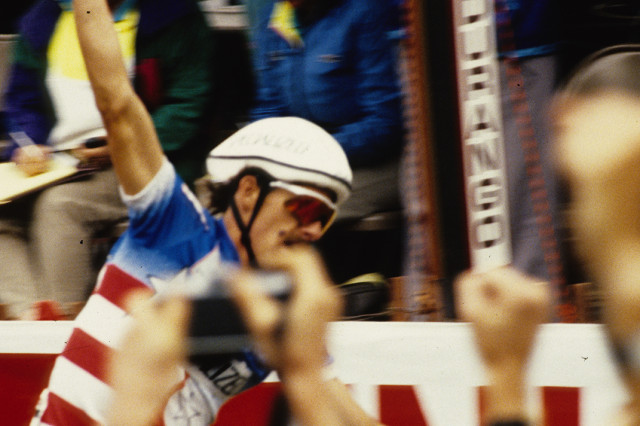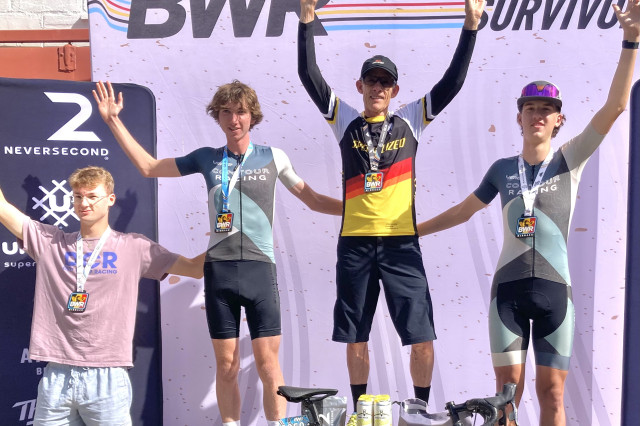[Header image by Romulo Cruz/Specialized]
Way back in 1990, the 35-year-old American cross-country mountain bike racer Ned Overend became the first ever official UCI MTB Cross Country World Champion, although he had already won both the unsanctioned US and European world titles before that.
On that long-lamented day, Ned stormed to the historic win on his home trails of Durango in Colorado. By that time, Ned was already a seasoned pro racer and beat young guns Thomas Frischknecht of Switzerland and Britain’s Tim Gould to score gold.
Mountain biking had finally come of legal age, and the sport soon boomed, with Ned being one of just a handful of the original US greats of the early years who managed to step up at pace with the rising standards. He would go on to win more World Cup rounds during the 90’s before turning his attention more towards the XTERRA offroad triathlon series, where he once again became World Champion.
Over the decades, Ned has continued to race bikes of all kinds at a high level, and also won the first US Fat Bike national title, the UCI Masters Cyclo Cross world title, and countless other honours.

ned2.jpg, by Specialized
Durango is a hotbed for many of the best US-born bike racers in the world, and even at 70 years old, many of them are still chasing Ned’s Strava KOMs – and Ned theirs. Just a couple of weeks back, Ned won the Carolina Belgian Waffle Ride mid-distance gravel race (60 miles – the Wafer), beating a whole bunch of very fast young guns in it.
We chased him down in a bid to locate his fountain of youth and speed. And while we were about it, we took the opportunity to get an insight into the recently announced 2030 return of the UCI MTB World Championships to Durango.
ORCC: The Belgian Waffle win – can you tell me a bit about how you prepared for it, and how your race preparation changed for you with age?
Ned Overend: I tried to ride for three to three and a half hours twice a week, which I’ve known I need to be doing, but turning 70 this year gave me a little more motivation to be disciplined with my training.
ORCC: How many races are you doing now, and how differently do you approach them in terms of seriousness/purpose, and also tactically, and balancing age with experience?
NO: I’ve done some gravel racing, like the Grasshopper event in Nor Cal in Feb, the e-bike race at the Catus Cup, and the Ironhorse Classic road race. Plus also some local series races.
ORCC: You won BWR by a big margin, and against fast young guys, how did you play it tactically, and what was their reaction to you riding away from them?
NO: BWR North Carolina started the 100-mile race and the 60-mile race together. So we both did 60 miles, and then the 100-mile racers did an extra 40-mile loop. I knew the key would be to hang with as many of the fast guys doing the 100 for as long as possible. I was better at staying with the fast guys than the other 60 milers. I came through the 60-mile finish in about eighth or ninth place amongst the 100 milers. Doing group rides with the super-fast local guys has helped me learn how to stay with them.
ORCC: How have your numbers, times, etc, declined over the years, and with Strava, and all of the tools we now have to monitor this, how do you use these?
NO: I’ve lost over 500 KOMs on Strava, and every time Strava sends me an email with the subject “Uh Oh, somebody took your KOM!” I save all those emails in a folder, because someday I am going to take those KOMs back, which will never happen.
I continue to use Strava segments for interval training, and have come to accept I won’t be hitting my times from several years ago.
ORCC: Your early days of mountain running, triathlon, XTERRA, etc, how has the cross-discipline element benefitted you on the bike?
NO: I have continued to do a bit of cross-training throughout my career, and I think it has made me a more durable athlete. (I think I’m) More balanced than a typical cyclist who just uses cycling-specific muscle groups.
I do a little running in the winter, but I try to swim year-round.
ORCC: Off-bike training, and especially with winter coming up – what is your approach and theory here, and for older athletes, how much more important has strength training become?
NO: Strength training is super important for older athletes to slow muscle loss, but it presents some challenges for me. I have arthritis in my hands, and lifting weights too often aggravates it. Swimming is easier on my hands. If I do 25-metre sprints, I can create the strain needed to build muscle. Nordic skiing in the winter is a great way to build whole-body strength and get an aerobic workout.
ORCC: With changing metabolisms, loss of muscle, etc, when aging, what has been your approach/advice on managing this?
NO: I have to adapt, and that’s a work in progress. I’m fortunate that I still have a high metabolism, so I can focus on getting the right nutrition without worrying about my weight. I supplement my protein with a protein shake in the morning, and I do some strength training to help prevent age-related muscle loss (sarcopenia). I should be doing more strength training, and that is my plan.

[Image credit – Ned Overend]
I am constantly researching longevity, diet, exercise, vax, and blood lipid screening to avoid heart disease, cancer prevention and early detection, and am a big fan of Peter Attia’s podcast (The Peter Attia Drive Podcast).
ORCC: Has e-MTB become a part of your riding/training? If so, what role can they play for older riders?
NO: I do some e-MTB’ing, though I mostly only ride e-bikes when I ride with other guys who prefer e-bikes. Though when I’ve targeted an e-bike race, then I use it a couple of days a week, to figure out how to cover ground the fastest while on a Levo. I raced the e-bike category at the Cactus Cup, and my son-in-law (who lives in Arizona) and I have been doing that event for the last couple of years. I won this year, and was second last year.
ORCC: Technically, and in risk-taking, have you changed over the years?
NO: That question relates to e-bike racing, because – yes, taking risks is more of a consideration for me now, and e-bike racing is riskier because everything is happening faster.
ORCC: With the World Championships returning to Durango in 2030, how did that come around? Were you involved, and how do you feel about it?
NO: I think it’s great because it is an opportunity to tell the worldwide mountain bike community about the role Durango and the US played in the development of the sport. It will also be cool to talk about how the equipment has progressed over the years.
Peter Van Den Abeele and Beat Wabel from the UCI reached out to Brendan Quirk at USA Cycling about having the 40th Worlds anniversary back in Durango. Brendan talked to Chris Blevins and Todd Wells (both from Durango), and they connected them to Gaige Sippy, who will manage the whole production. Gaige has been the promoter of the Iron Horse Classic and was involved when Durango hosted an MTB World Cup.
The 2030 Durango World Championships
ORCC: Is there likely to be a retro race element to the championships? How does the proposed course compare to the 1990 race?
NO: It would be a great idea to have an exhibition retro race! The course will be built around the base area to make it better for spectators and to avoid too much altitude.
ORCC: Will you be playing a role in the organisation, and will there be masters categories? If so, will you be likely to race?
NO: I am involved as an advisor to the race committee and will be involved in PR. The UCI asked us to run Masters Worlds the week before Elite Worlds, but we declined because we felt we needed to focus on the main event. So if I race, I will have to qualify for the National team. Maybe AI can help with that?
You might also like: